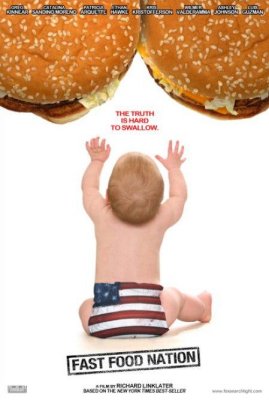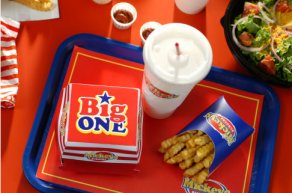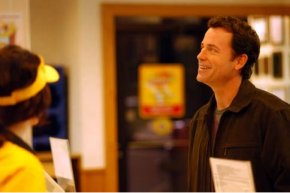|
Fast
Food Nation
Eric
Schlosser’s book Fast
Food Nation: The Dark Side of the All-American Meal
examined the practices of the U.S. fast food industry in
chilling detail. We all knew deep down that the food being
pedaled from drive-thru windows across the nation couldn’t
be healthy, but the truth uncovered in Schlosser’s
peeled back the layers of naiveté for countless Americans.
I recall
the excitement and fervor that surrounded the book after
its release in 2001. It was commonly passed amongst friends
and avid readers, and often prefaced to the uninitiated
with a resounding, “You must read this book.”
When
word began circulating that a film adaptation of Schlosser’s
book was in the works, the idea of an incendiary investigative
documentary based on the book seemed like an obvious move.
However, Schlosser wasn’t compelled to see his book
turned into a documentary, and the courting continued until
the writer was paired with director Richard Linklater. Schlosser
and Linklater set to work drafting a fictional film thematically
linked to the book, and through independent production methods,
the film’s message remained unfettered by outside
influence.
The
film centers on a fictional fast food chain called Mickey’s
and the lives of several people affected by the corporation.
Don Anderson (Greg Kinnear) is the marketing executive responsible
for the company’s biggest success, a burger called
The Big One. When outside tests reveal high levels of fecal
toxicity in the meat used to make The Big One, Don is sent
to unearth the truth and correct the problem.
The
film parallels Don’s journey with the journeys of
two other families: a group of Mexican immigrants led by
Raul (Wilmer Valderrama) who find work in the local meat
packing plant and Amber (Ashley Johnson) a teen eagerly
working for Mickey’s while searching for a sense of
direction.
While
many of the book’s themes regarding the health issues
surrounding fast food culture are addressed via conversations
between characters and non-fictional footage taken while
visiting meat packing plants under the guise of a film documenting
immigration practices, it still misses lacks the visceral
punch that the book had. Sure, there has been much discussion
regarding the filmed slaughter of a cow, which packs the
punch expected from film murder.
What
is missing is the visualization of just how easy it is for
meat to become contaminated. Workers are pressed to operate
at rapid pace on assembly lines, and we hear how fecal contamination
could occur under these conditions, yet we are never given
a visualization of the dirty truth – a move that would
have surely sent many viewers scrambling to repent their
fast food ways.
What
Linklater brings to the table is a sense of realistic everyday
life. We believe these characters motivations, and they
act according to each situation. The lives of immigrant
workers, and the ease of which they are exploited in the
name of profit, remains the true heart and soul of Fast
Food Nation. In the end, we are justifiably robbed
of any sense of resolution, yet the film still feels as
though it falls short of inciting a call to arms.
We are
given strong performances from Kinnear as an executive wrestling
with the truth, Ashley Johnson as a young American developing
a desire to affect change, and Wilmer Valderrama as an immigrant
who winds up being chewed up by the corporate machine. Catalina
Sandino Moreno, fresh off of her magnificent performance
in Maria Full of Grace defines sacrifice as Raul’s
wife, Sylvia.
Not
surprisingly, the cameos in the film resonate with differing
results. While Ethan Hawke and Bruce Willis act as bookends,
each giving voice to opposing perspectives in the fast food
debate, the use of Avril Lavigne as a voice of youthful
rebellion feels forced at times.
Even
the decision to base the film on a fictional chain called
Mickey’s could detract from the message in play here.
Sure, this move was understandably made due to legal concerns,
but why not avoid naming the chain altogether?
While
Fast Food Nation may not go as far as some of us
would like in preaching and exposing the ugly truths behind
the industry, it is bound to resonate amongst those less
inclined to listen in the first place.
Rating:

|








